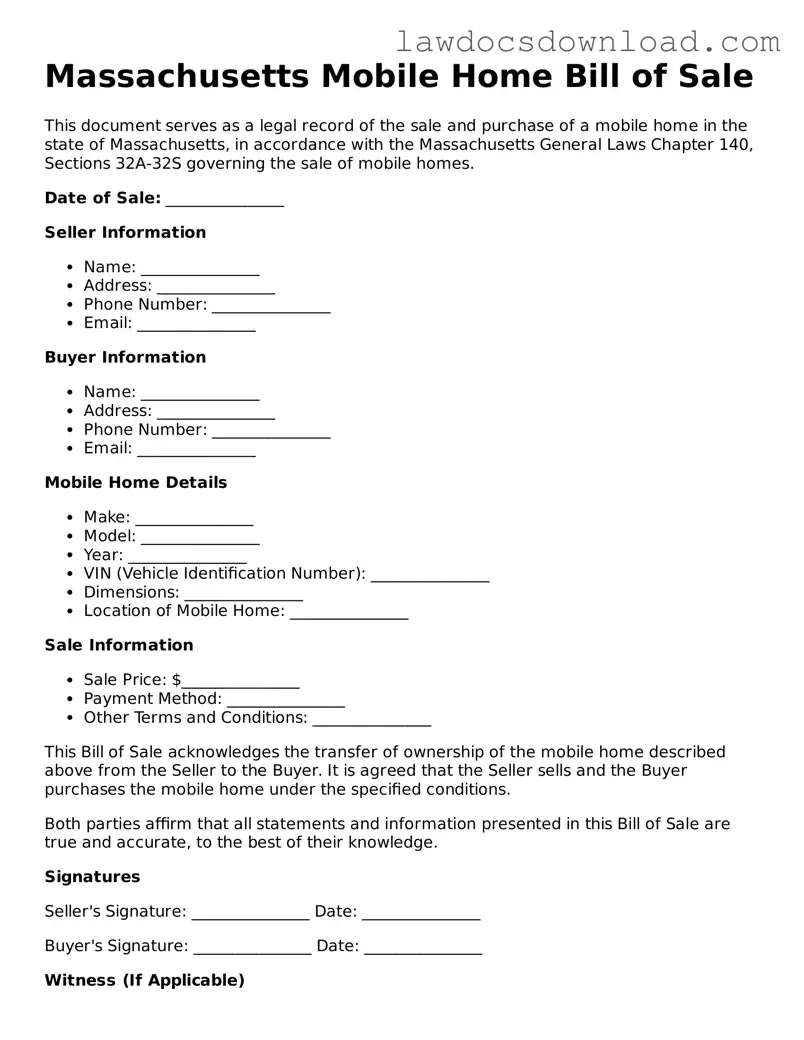The Vehicle Bill of Sale represents a document similar to the Massachusetts Mobile Home Bill of Sale, as it serves as a legal agreement recording the sale and transfer of ownership of a vehicle from a seller to a buyer. This document typically captures pertinent information such as the make, model, year, and VIN of the vehicle, along with the sale price and date, mirroring the structure used for documenting mobile home transactions. It provides proof of transaction and can be requisite for registration purposes, paralleling the role of a Mobile Home Bill of Sale in establishing legal ownership and compliance with local regulations.
Similarly, the Boat Bill of Sale documents the sale and transfer of ownership of a boat from one party to another. It encompasses details like the boat’s make, length, year, hull identification number (HIN), and the transaction specifics, including the sale date and amount. This parallels the Mobile Home Bill of Sale in its function to legitimize the transfer of ownership, serving as a vital document for registration and taxation purposes, and ensuring the buyer's legal possession, analogous to the procedural safeguards of mobile home sales.
A Real Estate Purchase Agreement is another document with similarities, focusing on the transaction of immovable property. This agreement outlines the terms and conditions of the sale of a property, including identification of the parties, description of the property, purchase price, and any other conditions precedent to the sale. Like the Mobile Home Bill of Sale, it acts as a binding agreement that solidifies the transaction, ensuring both parties adhere to agreed-upon terms and facilitating a smooth transfer of ownership, albeit tailored to real estate.
The General Bill of Sale is a more universal document, applicable to various personal property transactions, not limited to any specific item type. It documents the sale and transfer of ownership of personal property from seller to buyer, detailing the item(s) sold, the sale amount, and the parties involved. Although broader in scope, it shares the fundamental purpose with the Mobile Home Bill of Sale of serving as a record of sale and transfer of ownership, ensuring the legality of the transaction across diverse personal property sales.
The Firearm Bill of Sale specifically details the transaction and transfer of ownership of a firearm from one individual to another. It records essential information such as the make, model, caliber, and serial number of the firearm, akin to the detailed descriptions required in mobile home sales. The document aims to ensure a legal transaction, outlining the agreement terms and confirming that the transfer complies with federal and state regulations, paralleling the due diligence and legal framework observed in mobile home transactions.
An Equipment Bill of Sale is utilized in the sale and transfer of ownership of machinery or equipment. Like the Mobile Home Bill of Sale, it records the specifics of the equipment being sold, including a description, serial number, make, model, and conditions of the sale, such as the sale price and date. This document serves to legally document the transaction and transfer ownership, essential for both buyer and seller to prevent future disputes, similar to the protective role played by a Mobile Home Bill of Sale in personal property transactions.
The Business Sale Agreement documents the sale of a business from a seller to a buyer, detailing the assets being transferred, including physical assets, intellectual property, and goodwill, along with the terms of the sale, much like the comprehensive detail provided in a Mobile Home Bill of Sale. This agreement ensures a clear, legal transfer of the business and its components, protecting both parties by specifying the transaction's terms and conditions, akin to the security offered through detailed mobile home sale documentation.

